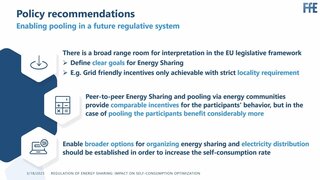Workshop on Approaches to the Energy Transition at the Municipal Neighbourhood Level
18 March, 2025

On 18 March 2025, experts from Germany and Israel came together for an in-depth virtual discussion on advancing energy transitions at the municipal neighbourhood level. The exchange highlighted challenges and opportunities in spatial planning, technological readiness, and regulatory frameworks for integrated local energy systems.
Central Discussion Points and Key Takeaways:
1. Defining the Spatial Environment and Planning Approaches
Participants emphasised that successful neighbourhood-level energy transition requires a holistic understanding of diverse urban environments. Both countries are developing frameworks that integrate residential, commercial, public, and industrial areas alongside transportation and grid infrastructure. German representatives stressed the need for harmonisation between federal, state, and municipal policies, while the Israeli side highlighted the pressure of rapid urban growth and the importance of early-stage integrated energy planning.
2. Technological Innovations and Readiness
As part of the presentation showcasing the best-practice example of Quartier Fürstenried in Munich, Germany highlighted how urban redensification can be designed and implemented in an energy-efficient, sustainable, and socially acceptable manner. The discussion also addressed the technical challenges associated with both horizontal and vertical redensification of existing buildings. Israel shared insights into managing peak loads and grid stability through scalable storage technologies at building and neighbourhood levels. There was consensus that intelligent local energy management systems (LEMS) will play a key role in maximising flexibility and efficiency.
3. Regulatory Frameworks
The discussion revealed a shared need for clearer and more enabling regulation. In Germany, recent developments such as the Wärmeplanungsgesetz (Heat Planning Act) and emerging frameworks for energy-sharing concepts were presented. The Israeli side pointed to regulatory gaps in enabling distributed energy generation and integrating PV and storage systems on a neighbourhood scale. Both countries agreed on the importance of removing bureaucratic hurdles and aligning energy regulations with urban development goals.
The discussion reinforced that neighbourhood-level energy transitions are critical to achieving national climate goals and improving urban resilience. Cross-sectoral cooperation, technological innovation, and enabling regulatory environments are essential building blocks. The next exchange will explore financing mechanisms and operational models to support the practical implementation of local energy transition strategies.